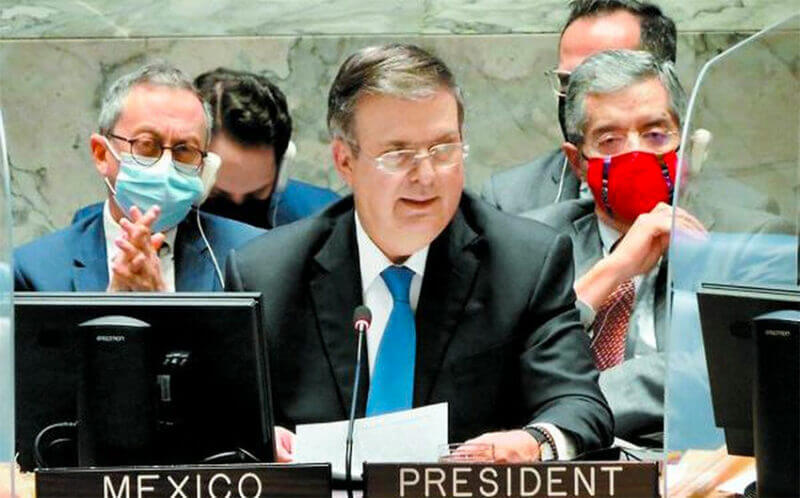United States-based gun manufacturers asked a U.S. federal court to dismiss a lawsuit brought against them by the Mexican government in August, arguing that it is not valid for a variety of reasons.
The federal government filed its lawsuit in the United States District Court in Massachusetts on August 4, accusing the gunmakers of negligent business practices that have led to illegal arms trafficking and deaths in Mexico.
In a 58-page joint memorandum filed with the court on Monday, nine firearms manufacturers and one distributor noted that the Mexican government is seeking to hold them legally responsible for violence perpetrated by drug cartels in Mexico.
“The complaint, however, does not allege that any of the moving defendants, who are law-abiding members of the business community in the United States, sell their firearms to the cartels. Nor does it even allege that they sell to any others who sell to the cartels,” the memorandum said.
“Instead, Mexico’s theory is that a series of third-party intermediaries in the United States legally or illegally sell and resell defendants’ firearms, which are then illegally obtained by criminal ‘straw purchasers,’ then illegally smuggled across the Mexican border, where they are eventually illegally used by drug cartels to commit criminal violence, which then gives rise to various financial harms suffered by the Mexican government,” said the defendants, among whom are Smith & Wesson, Barrett Firearms, Glock, Beretta and Sturm, Ruger & Co.
“For multiple reasons, the law cannot be stretched to impose liability over this spatial, temporal, and causal gulf.”
Mexico “does not have Article III standing to bring this case,” the memorandum said, referring to a prerequisite for a plaintiff to have a personal stake in the outcome of a lawsuit.
The defendants added that “it is a cardinal rule of standing that an injury is not fairly traceable to the defendant when,” according to a precedent, “it ‘results from the independent action of some third party not before the court.’”
“… Second, even if Mexico had standing, federal law would bar its claims at the threshold,” they said, noting that “federally licensed firearms manufacturers and sellers enjoy broad immunity against lawsuits claiming harms ‘resulting from the criminal or unlawful misuse of a [firearm]’ by a ‘third party.’”
The defendants also said that Mexico’s lawsuit “does nothing more than put a new coat of paint on a recycled and discredited set of claims” and that authorities have made it clear that “the firearm industry owes no common-law duty to Mexico.”
“Even where corporations directly sell harmful products to foreign citizens, courts routinely reject claims that they have any legal duty to protect foreign sovereigns from derivative harms. The absence of duty is especially clear here, where Mexico does not even allege that the defendants make private sales in Mexico,” the memorandum said.

“Fifth, Mexico fails to state a ‘public nuisance’ claim. Numerous courts in multiple contexts, including in cases involving firearms, have held that the public-nuisance doctrine does not apply to the manufacture and sale of lawful products,” it said.
“Finally, Mexico cannot invoke Mexican tort law to impose liability that would not be allowed under U.S. law. Under bedrock principles of international law, a foreign nation cannot use its own law to reach across borders and impose liability based on conduct in another country that was lawful when it occurred there,” the defendants said.
“By trying to do so, Mexico is effectively seeking to impose its own gun control policies on U.S. firearms companies … At bottom, this case implicates a clash of national values. Whereas the United States recognizes the right to keep and bear arms, Mexico has all but eliminated private gun ownership,” they said.
“Mexico can, of course, impose gun control within its own borders. But in this case it seeks to reach outside its borders and punish firearms sales that are not only lawful but constitutionally protected in the United States.”
The memorandum claimed that Mexico is seeking to bankrupt U.S. gunmakers and trying to “use the judiciary as a tool for circumventing an active diplomatic dispute between the United States and Mexico about the international effects of U.S. firearms policy.”
“This court need not play along. It should dismiss the complaint,” the defendants said.
The Mexican government has until January 31 to respond to the defendants’ arguments.
Meanwhile, Foreign Minister Marcelo Ebrard told the United Nations Security Council on Monday that the U.N.’s efforts to combat illegal arms trafficking have fallen short.
Much effort has gone into strengthening international cooperation to “prevent and counteract illegal practices in the weapons markets and their terrible consequences,” he said.
“However, we must recognize that our efforts have been insufficient.”
He said better mechanisms are needed to monitor and prevent the international trafficking of arms and called on private companies to contribute to the fight.
“Private actors must contribute with decisive self-regulation actions and monitoring in their distribution chains for the purpose of avoiding the diversion and illegal trafficking of weapons they produce and sell … to ensure that those they make in accordance with the law don’t reach criminal hands,” Ebrard said.
“… It’s not about questioning the rights of countries and private individuals to sell weapons legally but about denouncing negligent practices,” he said.
With reports from El Universal and Milenio
